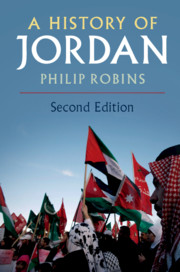Book contents
- A History of Jordan
- A History of Jordan
- Copyright page
- Dedication
- Contents
- Illustrations
- Maps
- Tables
- Acknowledgements
- Chronology
- Maps
- Introduction
- 1 On the Edge of Empire
- 2 Founding State and Regime
- 3 The Long Road to Independence
- 4 Loss of Innocence
- 5 The Roaring Fifties
- 6 The Road to Disaster
- 7 Illusions of Progress
- 8 Hussein’s Choices
- 9 Abdullah’s Governance Debate at Home
- 10 International Relations Under Abdullah
- Conclusion: Jordan: Still a Politely Run Authoritarian State
- Notes
- Bibliography
- Index
9 - Abdullah’s Governance Debate at Home
Published online by Cambridge University Press: 06 September 2019
- A History of Jordan
- A History of Jordan
- Copyright page
- Dedication
- Contents
- Illustrations
- Maps
- Tables
- Acknowledgements
- Chronology
- Maps
- Introduction
- 1 On the Edge of Empire
- 2 Founding State and Regime
- 3 The Long Road to Independence
- 4 Loss of Innocence
- 5 The Roaring Fifties
- 6 The Road to Disaster
- 7 Illusions of Progress
- 8 Hussein’s Choices
- 9 Abdullah’s Governance Debate at Home
- 10 International Relations Under Abdullah
- Conclusion: Jordan: Still a Politely Run Authoritarian State
- Notes
- Bibliography
- Index
Summary
The death of King Hussein, which was expected with increasing trepidation in the second half of the 1990s,1 came on 7 February 1999, with his funeral taking place a day later, on 8 February, according to local custom. In the latter stages of Hussein’s forty-six-year reign commentators had thought aloud about the ‘Franz Josef effect’: a monarch who had reigned for so long that his passing was unimaginable and any replacement, by implication, implausible. After a short period in which everyone held their breath, the analogy with the nineteenth-century Austrian Chancellor proved false. Hussein has been replaced, the succession has stuck, and political life – on the face of it – has continued more or less as before. There was undoubted shock and sadness at King Hussein’s passing almost throughout the whole country, as described by Nigel Ashton, in his introduction to his biography of King Hussein, which told the sombre story of the mass attendance at his funeral.2 But he has certainly not proved to be irreplaceable.
- Type
- Chapter
- Information
- A History of Jordan , pp. 210 - 241Publisher: Cambridge University PressPrint publication year: 2019



